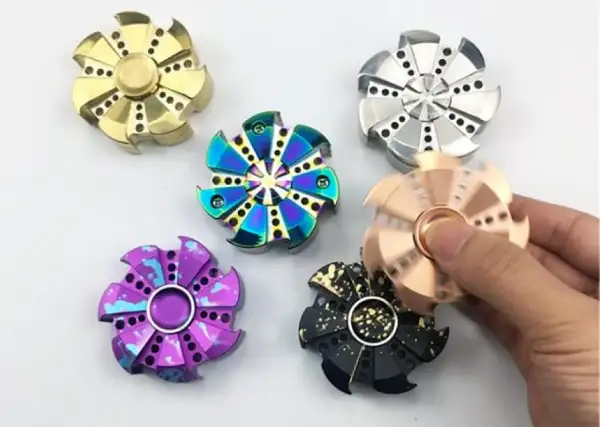Meet the Fidget Spinner, a New Toy Craze Entrancing Kids and Grownups Alike

Look out Hatchimals, bottle-flipping, and homemade slime: There's a hot new craze that is literally capturing the attention of America's kids—and quite a few adults too.
They're called fidget spinners. For the uninitiated, a fidget spinner is a gadget about the size of a drink coaster, with a bearing in the middle that allows it to spin. They're generally made of metal or plastic and feature two or three prongs that blur, entrancingly, as they twirl. Fidget spinner retail prices range from a few bucks to well into the hundreds.
You play with a fidget spinner by spinning it in your hand. You can also put it down and watch it spin on a table or the floor. That's it.
But that seems to be more than enough to launch an official phenomenon, with kids going crazy for them in Staten Island, Philadelphia, Michigan, Arizona, and beyond.
A search for "fidget spinner" at eBay turns up more than 29,000 results. Amazon yields roughly 16,500 results from the same search, with prices ranging from about $2 all the way up to $460. Smaller sellers like GoSpinner sell dozens of different models, including a bestseller offered for free (customers just pay for shipping), and others that might, say, glow in the dark or resemble the Batman symbol. There are also requisite groups on Reddit and Facebook devoted to fidget spinners, plus hundreds of videos on YouTube of people showing their gadgets off. Dozens of these videos feature cats playing with fidget spinners, and yes, they basically play with them the same way that humans do—by spinning and watching, and then spinning and watching some more.
What makes fidget spinners especially interesting—and perhaps, especially marketable—is that they're not being promoted as fun, simple distractions. Just the opposite, actually. The pitch is that fidget spinners help the user to stop fidgeting and focus better. Some of the gadgets are billed as "designed to relieve Stress, Anxiety, ADD & ADHD, Autism."
"It stimulates the part of the mind that gets bored, so they can fidget with that, and then they can be creative thinking otherwise," the owner of a pair of Learning Express stores in Pennsylvania said regarding fidget spinners. "The part that gets bored gets stimulated, and it helps them focus the other part of their brain."
Some aren't as enthralled.
An essay—well, let's be honest, a rip-roaring rant—from a teacher who calls fidget spinners "The Effing Worst," published this week by Working Mother, tells quite a different story. "The only thing my students seem to focus on," the author writes, "is the spinner, itself, and not their work. It’s like a friggin’ siren song. The allure of someone else’s spinner spinning is too much to bear." She goes on:
As the teacher, I am thoroughly distracted by your child’s trendy toy. It makes it difficult for me to focus and do my job, and I worry about the students in the room who are completely thrown off track because it’s all they see. These are not the helpful devices they were intended to be.
Some schools have felt forced to ban fidget spinners from classrooms because the mania is too distracting. Christian Bruce, a 7th grade English teacher in southeastern Kentucky, told Money that his administration just sent word to families that the gadgets should no longer be brought to school.
Bruce said the craze caught on astonishingly quickly in his school. "I saw one or two and then they exploded,” he said. “Every student seems like they’ve got one.” At least one enterprising student at Bruce's school cashed in before the fidget spinner ban—earning more than $200 in profit by purchasing a bunch online for $5 apiece and reselling them to classmates for $10.
It's not just kids who are hypnotized by fidget spinners. They've become the favorite office toy for many grownups who might otherwise be absorbed with Baoding Balls or fidgeting relentlessly at work.
Eric Limer, a deputy editor at Popular Mechanics and "horrific fidgeter," wrote recently of his newfound fascination for fidget spinners, especially a $250 titanium model from the Seattle-based company Torqbar. "It feels like a piece of jewelry with the heft of a well-made tool and spins with a quiet, serene hiss," Limer explained.
Even so, he admitted: "Don't get me wrong, these are truly lovely pieces, but they're also just metal trinkets with no practical use."
A few months ago, several staffers at Forbes tested out some fidget spinners at home and the office, and most were pleased, if not exactly sold on the idea that there are any genuine mental health benefits:
Some found we were more present in our daily lives -- fidgeting with the spinner on the subway and paying attention to our surroundings rather than burying our faces in our phones. A few of us noticed we got up from our desks less, dumping energy into fidgeting with the spinner rather than taking mindless trips to the pantry.
And there you have perhaps the core reason fidget spinners are such a hit right now. Sure, they're a distraction. But we live in an age of endless distractions, and perhaps this latest distraction is distracting us from even worse, more anti-social, unhealthy, and unproductive distractions.
"At the end of the day, this fad isn’t bad," one dad wrote this week in a highly amusing fidget spinner review for the Arizona Republic. "When kids are playing it, they’re not looking at their phone or iPad."
Same goes for grownups. And cats too, for that matter.
We’ve included affiliate links into this article. Click here to learn what those are.
